2010 Exchange
Going Global: Master of Agribusiness program to expand in Southeast Asia
Ag Econ Alumnus wins Kansas governor's race
AgManager.info earns AAEA’s Electronic Media Education Award
ACCC awards $38,000 in scholarships, continues development campaign
Can Economists Help Fight AIDS?
Graduate student teams take 1st, 2nd places in AAEA Case Study Competition
Ressegieu honored with 2010 Distinguished Alumnus award
K-State Biofuels Study is 6th “Hottest Article”
![]()
From the Department Head
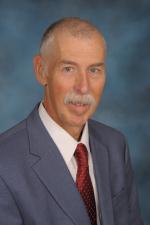 Welcome to the Fall 2010 issue of the “Exchange.”I hope you enjoy reading highlights of our recent accomplishments and activities.
Welcome to the Fall 2010 issue of the “Exchange.”I hope you enjoy reading highlights of our recent accomplishments and activities.
It was very exciting to see how well our graduate students performed at this year’s annual Agricultural and Applied Economics Association meetings in Denver.
Six of our graduate students formed two teams for the Graduate Student Case Study Competition. The teams developed and evaluated expansion plans for a Pacific Northwest miller. The K-State teams won first and second place honors out of the eleven teams competing. So impressed was the owner of the milling firm that he followed up with both teams after the competition to get additional input on his firm’s business plans.
In addition to the Case Study teams, Lee Schulz, a Ph.D. student, won second place in the Extension Section’s Graduate Student Paper competition. Lee’s presentation was based on work he is doing with Ted Schroeder looking at the costs and benefits of traceability in livestock production.
In addition to these award-winning efforts, all of our graduate students were highly visible at the Denver meetings. The students presented papers and posters, moderated sessions and made a great impression on the 2,000 attendees.
One element in President Schulz’s goal for Kansas State University to be a top public research university is guiding students in applied research. The awards our students won in Denver (and elsewhere over the year) indicate how well-prepared our students are for addressing issues in agriculture, natural resources, and agribusiness. The agribusiness professionals enrolled in the department’s Master of Agribusiness program similarly apply the skills they learn in their courses to help solve problems and exploit opportunities their businesses are currently facing.
We are in competition with universities around the world for attracting the best and the brightest graduate students to Kansas State. We are successful, and our program is highly rated. Our success hinges upon continuing to offer the finan- cial support needed to bring students to Manhattan. We currently provide assis- tance to 18 Ph.D. and 26 M.S. on-campus students. Our faculty are very successful in attracting external funds to support our graduate students. Former faculty and friends of the department have been extremely generous in designating and funding several graduate student scholar- ship funds. We are exploring options to provide support for distance education students in the MAB program.
Thanks for the support that many of you already provide for our faculty, graduate students and undergraduate students.
~ David Lambert, Department Head
![]()
Going Global: Master of Agribusiness program to expand in Southeast Asia
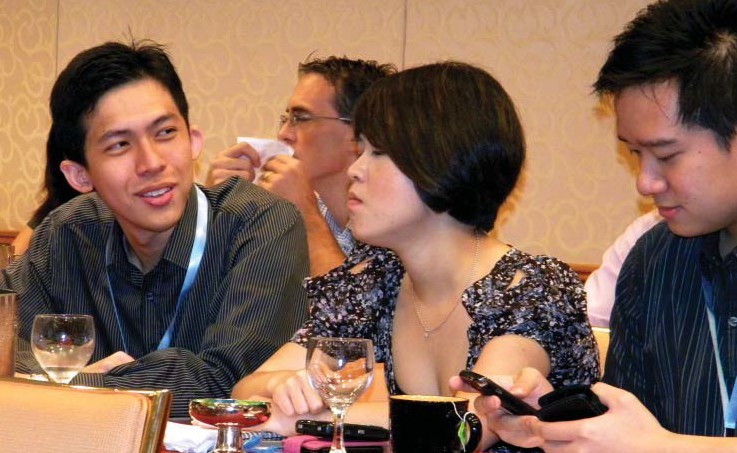 For 13 years, the Kansas State University Master of Agribusiness distance-degree program has helped agribusiness professionals gain the knowledge and skills to excel in today’s rapidly changing and increasingly complex, global food and agricultural economy. Now, the program is working to expand across the world.
For 13 years, the Kansas State University Master of Agribusiness distance-degree program has helped agribusiness professionals gain the knowledge and skills to excel in today’s rapidly changing and increasingly complex, global food and agricultural economy. Now, the program is working to expand across the world.
Working with industry partners including the National Renderers Association, U.S. Soybean Export Council, U.S. Grains Council and U.S. Wheat, the MAB program is exploring the possibility of creating a new section of the program in Southeast Asia.
MAB students earn a master’s degree in two and a half years while doing course work using the internet, DVD, podcasts and multi-audio chatrooms. Currently, students visit K-State during four one-week campus sessions where they start coursework, meet other students and faculty, receive training on the technology used, interact with industry leaders and give group project presentations.
In the proposed new cohort, the “on-campus” portion of the program will be offered at the Universiti Sains Malaysia in Penang, Malaysia, beginning in May 2011. The curriculum will be adapted to southeast Asia’s business environment.
“Interest in the MAB program from those outside the United States continues to grow,” said Allen Featherstone, professor of agricultural economics and director of the Master of Agribusiness program. “Many agribusiness professionals have expressed a desire to obtain a master’s degree to equip them with business and economic skills and an increased understanding of food and agribusiness systems on a global scale.”
However, many international students have difficulty participating in a U.S. program due to travel constraints for on-campus sessions and, to a lesser extent, U.S. visa issues, Featherstone adds. The new cohort will provide international agribusiness students another option for continuing their education.
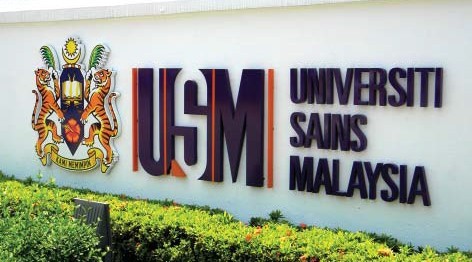 Employees of multi-national companies also may find this new cohort offers an even greater international education. The MAB program has a globally diverse mix of students in its current classes, but the opportunity to study abroad enhances the international learning experience and creates global industry connections.
Employees of multi-national companies also may find this new cohort offers an even greater international education. The MAB program has a globally diverse mix of students in its current classes, but the opportunity to study abroad enhances the international learning experience and creates global industry connections.
“While I knew the ag equipment business from my years of work experience, I realized the need to update, broaden and deepen my analysis and quantitative decision making skills," said Dave Rock, an MAB Alumnus and Manager, Dealer Strategy with John Deere Company in Lenexa, Kan. "I chose the MAB program due to its focus on agribusiness topics and direct approach to developing the new skills and knowledge I wanted."
“Our business is increasingly global. The opportunity to complete the same program with campus sessions at an international location would have been an even deeper experience,” Rock said.
![]()
Ag Econ Alumnus wins Kansas governor's race
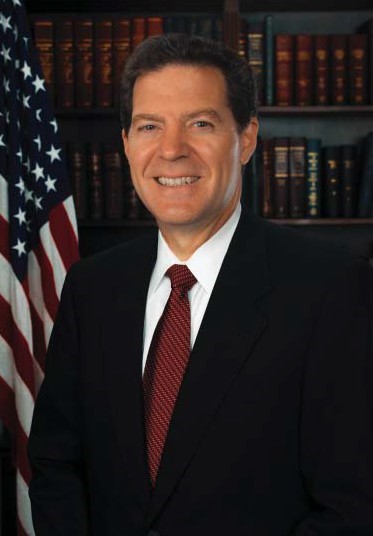 After 16 years in Washington, D.C., Senator Sam Brownback is headed for the Kansas governor's office.
After 16 years in Washington, D.C., Senator Sam Brownback is headed for the Kansas governor's office.
Brownback won the Kansas governor’s race Nov. 2 over Democratic opponent Tom Holland. The Republican governor-elect is a 1978 K-State graduate in agricultural economics. Originally from Parker, Kan., Brownback served as K-State student body president and Kansas FFA president. He went on to the University of Kansas Law School and was president of his class.
In 1987, the K-State Agricultural Economics Department honored Brownback with the distinguished alumnus award.
Over the years, Brownback has been a radio broadcaster, attorney, teacher, administrator, congressman and senator.
Brownback served as a White House Fellow in the first Bush Administration and was the youngest Secretary of Agriculture in Kansas history. When he was 38, he was elected to the House of Representatives from the 2nd Congressional District covering Eastern Kansas. In 1996, he was elected to the U.S. Senate seat once held by Bob Dole.
In the current Congress, Brownback is the top-ranking Republican on the Agriculture Appropriations Subcommittee, which oversees U.S. Department of Agriculture programs as well as food safety and agencies responsible for protection of public health such as the Food and Drug Administration.
Brownback and his wife Mary have five children; Abby, Andy, Liz, Mark and Jenna. They live in Topeka.
![]()
Outstanding Online Resources
AgManager.info earns AAEA’s Electronic Media Education Award
For the past eight years, K-State agricultural economists have worked diligently to combine their information into a comprehensive source of applied research and economic information.
Their work was rewarded with the Agricultural and Applied Economics Association (AAEA) Outstanding Electronic Media Education Award for 2010 at that organization’s national meeting in Denver. The AgManager.info site is the work of Rich Llewelyn, K-State agricultural economist and site manager, and a team of K-State agricultural economists including Kevin Dhuyvetter, Art Barnaby, Dan O’Brien, Troy Dumler, Michael Langemeier, Vincent Amanor-Boadu, Ted Schroeder and Alicia Goheen.
“The AgManager.info website is the flagship of electronic extension and education programs for K-State’s Department of Agricultural Economics,” Llewelyn said.
The site features livestock marketing, including weekly “In the Cattle Markets” updates; grain marketing, biweekly “Grain Outlook” reports; crop insurance and government programs; and farm management information, including a large variety of Excel spreadsheets and web-based decision tools, such as crop and livestock budgets, land/lease tools, and data sets.
AgManager.info has recently had some additions and upgrades, noted Llewelyn.
“RSS feeds and web-browser dashboards for decision tools are complemented by more than 50 Excel spreadsheet tools that help crop and livestock producers manage risk and make decisions,” he said.
Another risk management tool, the grain basis tool, provides weekly historical grain basis information dating back to 1998 for wheat, corn, grain sorghum and soybeans from about 800 locations in the High Plains. Associated GIS maps of grain basis and the deviation from the three year average also are available weekly.
Recent site additions of interest to the livestock industry include “Connecting Livestock Producers Recent Economic Research,” or CLPER quarterly newsletter by Glynn Tonsor extension livestock marketing specialist; “Cattle Finishing Returns,” a monthly newsletter by Michael Langemeier; and departmental theses and dissertations.
Other materials include weekly updates to livestock and hay charts, monthly grain supply and demand charts, and projected and historical livestock budgets.
The site is now more accessible with top menus on the main pages and all decision tools on one page. The updated Kansas Farm Management Association site is better integrated into AgManager. Also, the AAEA “Choices” magazine is now available with recent research and policy analysis.
![]()
ACCC awards $38,000 in scholarships, continues development campaign
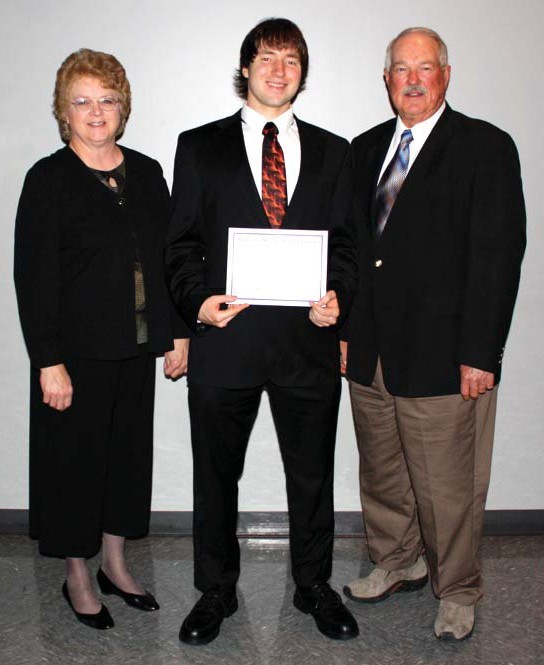 As a premier center of excellence in cooperative education, staff in the Arthur Capper Cooperative Center (ACCC) have had a busy and rewarding year working with cooperatives and their employees.
As a premier center of excellence in cooperative education, staff in the Arthur Capper Cooperative Center (ACCC) have had a busy and rewarding year working with cooperatives and their employees.
Two national invitation-only conferences, one state conference and numerous educational meetings with local and regional cooperatives along with cooperative lecture series, director education programs, board retreats, board evaluations and financial planning projects are just some of the ways the ACCC is providing cooperative education to cooperative leaders in Kansas and around the country.
In addition to outreach opportunities, the ACCC cooperative scholarship program has awarded $355,400 since 1985 on behalf of the cooperative community, including $38,000 awarded for 2010-11.
Students who meet the K-State College of Agriculture’s scholarship standards are invited to apply for the cooperative scholarships. A committee of faculty and cooperative leaders awards the scholarships, two of which require an on-campus interview process.
It’s a rigorous but rewarding process. Three of the scholarships are $5,000 and the others range from $1,000 to $3,500.
In addition, the center is continuing a development campaign to help increase resources to continue their cooperative educa- tion programming in the future. Two of the campaign’s main goals include providing additional cooperative scholarship funds and creating a distinguished professor position to help keep top cooperative educators at K-State. Individuals and cooperatives have a variety of giving options. Learn more about the campaign on the center’s website, http://accc.ksu.edu/accccampaign.htm.
![]()
Can Economists Help Fight AIDS?
Study of Zambia’s Pulse Value Chains Could Help Reduce Spread of HIV/AIDS
Today, in a Zambian cemetery, dozens of funerals will take place. Families will mourn the loss of loved ones, while nearby, mounds of dirt mark the fresh graves of those lost just days earlier.
It’s a typical day in this southern African nation of 12 million people, which has the one of the highest HIV/ AIDS infection rates in the world. In fact, one in seven Zambian adults is living with HIV and the average life expectancy at birth is just 39 years, according to the 2008 data from the Joint United Nations Program on AIDS.
 Three years ago, Vincent Amanor- Boadu, associate professor of agribusiness, economics and management, was visiting Zambia, where his friend drove him to a busy cemetery.
Three years ago, Vincent Amanor- Boadu, associate professor of agribusiness, economics and management, was visiting Zambia, where his friend drove him to a busy cemetery.
He’ll never forget what he saw. Research shows that the incidence of poverty among women increases their risk of contracting HIV/AIDS. Addressing the economic challenges women face could alleviate the pressures that cause their increased exposure to the disease. This is what Amanor-Boadu and his team of researchers are attempting to do.
“If we can increase their entrepreneurial capacity, then people can make better decisions for themselves,” Amanor- Boadu said.
The Pulse Value Chain Initiative (PVCI) Research team is comprised of researchers from Kansas State University and the University of Zambia. The team seeks to estimate how and where value is created in the pulse value chains in Zambia. Pulses include beans, lentils, black-eye peas and pigeon peas.
The research is supported by a two-year grant from the Pulse Collaborative Research Support Program (Pulse CRSP),
a program funded by the United States Agency for International Development (USAID).
The other K-State team members are Tim Dalton, associate professor, and Allen Featherstone, professor, both in the Department of Agricultural Economics. The Zambian team is led by Dr. Gelson Tembo in the Department of Agricultural Economics, University of Zambia.
The PVCI hopes the knowledge derived from their research will allow them to improve farmers’ role in the pulse value chain in Zambia and, in so doing, extract a larger share of the total value created in the chain.
In addition to funding research on the pulse value chain, the USAID grant will help three Zambian students join K-State’s Masters of Agribusiness program as well as support three Master of Science students and six senior undergraduate students at the University of Zambia.
“When farmers, especially women, can increase their share of the value they create through careful value-enhancing strategies, we empower them to control their economic and social situations, and that can be the difference between life and death,” Amanor-Boadu noted.
![]()
Graduate student teams take 1st, 2nd places in AAEA Case Study Competition
Two teams of K-State agricultural economics graduate students earned top honors in the 2010 Graduate Student Case Study competition at the Agricultural and Applied Economics Association July meeting in Denver, Colo.
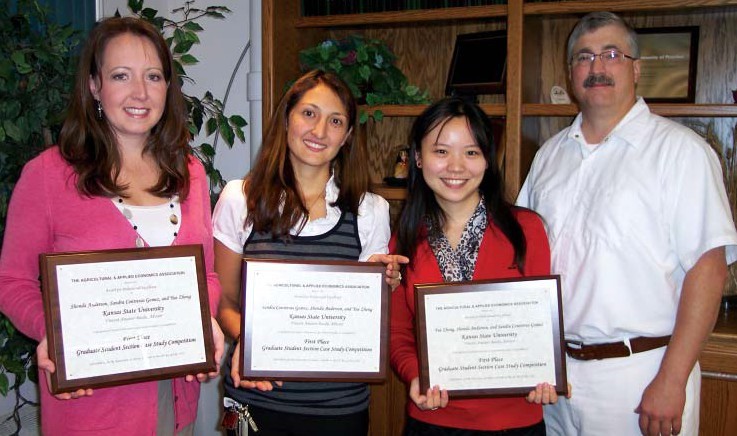 The first place team included Shonda Anderson, Sandra Contreras Gomez and Yue Zheng. The second place team included Graciela Andrango, Elizabeth Canales and Jaeljattin Jean. All are graduate students in agricultural economics.
The first place team included Shonda Anderson, Sandra Contreras Gomez and Yue Zheng. The second place team included Graciela Andrango, Elizabeth Canales and Jaeljattin Jean. All are graduate students in agricultural economics.
Students were given two weeks to answer a real-world situation and build a presentation explaining their analysis. They gave presentations to two sets of judges, and presented again as finalists to a new panel including the company owner of the case study subject.
The winning team’s presentation, “Expanding the Shepherd’s Grain Brand: The Crossroads of Economics and Sustainability,” studied the production and marketing challenges of wheat growers supplying a branded food product.
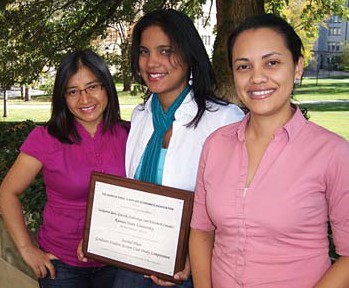 “The founders had the drive to market their wheat beyond the elevator. (They) wanted to include part of the food supply channel on the other side of the mill. In order to do that, they had to figure out a few things along the way,” wrote Anderson, Contreras Gomez and Zheng.
“The founders had the drive to market their wheat beyond the elevator. (They) wanted to include part of the food supply channel on the other side of the mill. In order to do that, they had to figure out a few things along the way,” wrote Anderson, Contreras Gomez and Zheng.
In their presentation, the winning team detailed the company’s challenges and solutions, as well as outlook for the future.
Advisors of Anderson, Contreras Gomez and Zheng were Vincent Amanor- Boadu, assistant professor of agricultural economics, and Jeffrey Gwirtz, associate professor of grain science and industry.
Michael Boland, former professor in K-State agricultural economics, advised Andrago, Jean and Canales.
![]()
Ressegieu honored with 2010 Distinguished Alumnus award
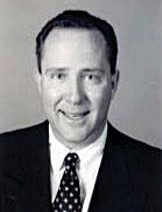 Matthew Ressegieu ’81, was recognized with the 2010 Distinguished Alumni Award during the Student-Alumni Awards Banquet on Sept. 24. The award is given to an alumnus who has demonstrated significant professional achievement related to agricultural economics or agribusiness.
Matthew Ressegieu ’81, was recognized with the 2010 Distinguished Alumni Award during the Student-Alumni Awards Banquet on Sept. 24. The award is given to an alumnus who has demonstrated significant professional achievement related to agricultural economics or agribusiness.
Ressegieu is the managing member of MMR Enterprises, LLC, a large family business with holdings in Kansas, Nebraska and Wyoming. Over the years, Ressegieu has diversified the business, which includes agricultural operations and land management in excess of 80,000 acres, commercial real estate, alternative energy exploration leases and securities portfolio management.
Ressegieu received his bachelor’s degree in agricultural economics with a minor in accounting from K-State in 1981. He received his law degree from the University of Wyoming in 1990. He also completed his LLM in taxation from Denver University in 1995.
After being admitted as a certified public accountant in Nebraska in 1984, Ressegieu worked as a tax accountant emphasizing partnership and corporate tax planning. As a practicing tax attorney, he provided legal services in the areas of estate, business and retirement planning for high-level professionals and small business owners. He has continued to provide these planning services for clients as corporate counsel in advanced planning for a large financial services firm. Last year he had the opportunity to serve as an adjunct professor of business law at Emporia State University.
![]()
K-State Biofuels Study is 6th “Hottest Article”
Peer scientists rated a journal article on biofuels by K-State researchers number 6 in the Top 25 Hottest Articles on biomass and bioenergy on Sciverse Science Direct, an online scientific database.
Vincent Amanor-Boadu, associate professor of agribusiness and four other K-State faculty co-authored, “Bio-butanol vs. bio-ethanol: A technical and economic assessment for corn and switchgrass fermented by yeast or Clostridium acetobutylicum.
The article was published in the April 2010 issue of “Biomass and Bioenergy.” It summarized research studying fermentation-derived butanol as an alternative to ethanol as a biomass-based liquid transportation fuel.
The article suggests that n-butanol may not be a viable ethanol alternative due to reduced energy yield, increased greenhouse gas emission, longer production time and increased capital costs.
Co-authors include Peter H. Pfromm, professor of chemical engineering; Richard Nelson, associate professor of engineering and head of the Kansas Industrial Extension Service; Praveen Vadlani, assistant professor of grain science and industry; and Ronald Madl, administrator of grain science and industry.
